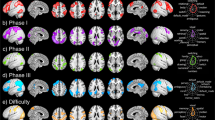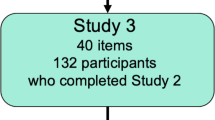Abstract
Humans are nature’s most intelligent and prolific users of external props and aids (such as written texts, slide-rules and software packages). Here we introduce a method for investigating how people make active use of their task environment during problem-solving and apply this approach to the non-verbal Raven Advanced Progressive Matrices test for fluid intelligence. We designed a click-and-drag version of the Raven test in which participants could create different external spatial configurations while solving the puzzles. In our first study, we observed that the click-and-drag test was better than the conventional static test at predicting academic achievement of university students. This pattern of results was partially replicated in a novel sample. Importantly, environment-altering actions were clustered in between periods of apparent inactivity, suggesting that problem-solvers were delicately balancing the execution of internal and external cognitive operations. We observed a systematic relationship between this critical phasic temporal signature and improved test performance. Our approach is widely applicable and offers an opportunity to quantitatively assess a powerful, although understudied, feature of human intelligence: our ability to use external objects, props and aids to solve complex problems.
This is a preview of subscription content, access via your institution
Access options
Access Nature and 54 other Nature Portfolio journals
Get Nature+, our best-value online-access subscription
$29.99 / 30 days
cancel any time
Subscribe to this journal
Receive 12 digital issues and online access to articles
$119.00 per year
only $9.92 per issue
Buy this article
- Purchase on Springer Link
- Instant access to full article PDF
Prices may be subject to local taxes which are calculated during checkout




Similar content being viewed by others
Code availability
The routines/code that were used to perform the statistical analyses in this study are available from the corresponding author upon request. For the routine/code that was used for simulating the dual-mode and single-mode problem-solvers see Supplementary Code.
Data availability
The data that support the findings of this study are available from the corresponding author upon request.
References
Jensen A. R. The G Factor: The Science of Mental Ability. (Praeger, Westport, CT, USA, 1998).
Deary, I. J., Strand, S., Smith, P. & Fernandes, C. Intelligence and educational achievement. Intelligence 35, 13–21 (2007).
Kyllonen, P. C. & Christal, R. E. Reasoning ability is (little more than) working-memory capacity?! Intelligence 14, 389–433 (1990).
Engle, R. W., Tuholski, S. W., Laughlin, J. E. & Conway, A. R. Working memory, short-term memory, and general fluid intelligence: a latent-variable approach. J. Exp. Psychol. Gen. 128, 309–331 (1999).
Duncan, J. et al. A neural basis for general intelligence. Science 289, 457–460 (2000).
Conway, A. R., Cowan, N., Bunting, M. F., Therriault, D. J. & Minkoff, S. R. A latent variable analysis of working memory capacity, short-term memory capacity, processing speed, and general fluid intelligence. Intelligence 30, 163–183 (2002).
Engle, R. W. Working memory as executive attention. Curr. Dir. Psychol. Sci. 11, 19–23 (2002).
Kyllonen, P. C. In The General Factor of Intelligence: How General Is It? (eds. Sternberg, R. J. & Gigorenko, E. L.) 415–445 (Erlbaum, Mahwah, NJ, USA, 2002).
Baddeley, A. Working memory: looking back and looking forward. Nat. Rev. Neurosci. 4, 829–839 (2003).
Colom, R., Flores-Mendoza, C. & Rebollo, I. Working memory and intelligence. Pers. Indiv. Differ. 34, 33–39 (2003).
Conway, A. R., Kane, M. J. & Engle, R. W. Working memory capacity and its relation to general intelligence. Trends Cogn. Sci. 7, 547–552 (2003).
Gray, J. R., Chabris, C. F. & Braver, T. S. Neural mechanisms of general fluid intelligence. Nat. Neurosci. 6, 316–322 (2003).
Olesen, P. J., Westerberg, H. & Klingberg, T. Increased prefrontal and parietal activity after training of working memory. Nat. Neurosci. 7, 75–79 (2004).
Kane, M. J., Hambrick, D. Z. & Conway, A. R. A. Working memory capacity and fluid intelligence are strongly related constructs. Psychol. Bull. 131, 66–71 (2005).
Jaeggi, S. M., Buschkuehl, M., Jonides, J. & Perrig, W. J. Improving fluid intelligence with training on working memory. Proc. Natl Acad. Sci. USA 105, 6829–6833 (2008).
Hutchins, E. Cognition in the Wild. (MIT Press, Cambridge, MA, USA, 1995).
Clark, A. & Chalmers, D. The extended mind. Analysis 58, 7–19 (1998).
Clark, A. An embodied cognitive science? Trends Cogn. Sci. 3, 345–351 (1999).
Giere, R. in The Cognitive Bases of Science (ed.s Carruthers, P., Stitch, S. & Siegal, M.) 285–299 (Cambridge Univ. Press, Cambridge, UK, 2002).
Clark, A. Supersizing the Mind: Action, Embodiment, and Cognitive Extension. (Oxford Univ. Press, Oxford, 2008).
Rowlands, M. The New Science of the Mind: From Extended Mind to Embodied Phenomenology. (MIT Press, Cambridge, MA, USA, 2010).
Bocanegra, B. R. Troubling anomalies and exciting conjectures: a bipolar model of scientific discovery. Emot. Rev. 9, 155–162 (2017).
Lee, K., & Karmiloff-Smith, A. In Perceptual and Cognitive Development (eds. Gelman R. et al.) 185–211 (Academic Press, New York, 1996).
Mithen, S. In Evolution and the Human Mind (eds. Carruthers, P. & Chamberlain, A.) 207–217 (Cambridge Univ. Press, Cambridge, UK, 2002).
Clark, A. Natural-born Cyborgs: Minds, Technologies and the Future of Human Intelligence. (Oxford Univ. Press, Oxford, UK, 2003).
Risko, E. F. & Gilbert, S. J. Cognitive offloading. Trends Cogn. Sci. 20, 676–688 (2016).
Risko, E. F. & Dunn, T. L. Storing information in-the-world: metacognition and cognitive offloading in a short-term memory task. Conscious. Cogn. 36, 61–74 (2015).
Gilbert, S. J. Strategic offloading of delayed intentions into the external environment. Q. J. Exp. Psychol. 68, 971–992 (2015).
Vallée-Tourangeau, F., Euden, G. & Hearn, V. Einstellung defused: interactivity and mental set. Q. J. Exp. Psychol. 64, 1889–1895 (2011).
Vallée-Tourangeau, F., Steffensen, S. V., Vallée-Tourangeau, G. & Sirota, M. Insight with hands and things. Acta Psychol. 170, 195–205 (2016).
Weller, A., Villejoubert, G. & Vallée-Tourangeau, F. Interactive insight problem solving. Think. Reasoning 17, 424–439 (2011).
Kirsh, D. & Maglio, P. On distinguishing epistemic from pragmatic action. Cognitive Sci. 18, 513–549 (1994).
Kirsh, D. Thinking with external representations. AI Soc. 25, 441–454 (2010).
Duncan, J., Chylinski, D., Mitchell, D. J. & Bhandari, A. Complexity and compositionality in fluid intelligence. Proc. Natl Acad. Sci. USA 114, 5295–5299 (2017).
Kaplan, R. & Saccuzzo, D. Psychological Testing: Principles, Applications, and Issues. 8th edn. (Cengage, Boston, 2012).
Barabasi, A. L. The origin of bursts and heavy tails in human dynamics. Nature 435, 207–211 (2005).
Tomasello, M. The Cultural Origins of Human Cognition (Harvard Univ. Press, Cambridge, MA, USA, 2009).
Goodale, M. Thinking outside the box. Nature 457, 539–539 (2009).
Acknowledgements
The authors received no specific funding for this work. The funders had no role in study design, data collection and analysis, decision to publish or preparation of the manuscript.
Author information
Authors and Affiliations
Contributions
B.R.B., F.H.P. and B.F. designed the experiments. B.R.B. carried out the experiments, simulations and statistical analyses. B.R.B., F.H.P., B.F. and A.C. wrote the paper.
Corresponding author
Ethics declarations
Competing interests
The authors declare no competing interests.
Additional information
Publisher’s note: Springer Nature remains neutral with regard to jurisdictional claims in published maps and institutional affiliations.
Supplementary information
Supplementary Information
Supplementary Methods, Supplementary Results, Supplementary Tables 1 and 2, Supplementary Note, Supplementary Figs 1–10, and Supplementary References
SI Guide
An explanation of how the Supplementary Code can be run.
Supplementary Code
An excel file that allows simulations of the data, noted in the SI and described in the SI Guide.
Rights and permissions
About this article
Cite this article
Bocanegra, B.R., Poletiek, F.H., Ftitache, B. et al. Intelligent problem-solvers externalize cognitive operations. Nat Hum Behav 3, 136–142 (2019). https://doi.org/10.1038/s41562-018-0509-y
Received:
Accepted:
Published:
Issue Date:
DOI: https://doi.org/10.1038/s41562-018-0509-y
This article is cited by
-
Extended plant cognition: a critical consideration of the concept
Theoretical and Experimental Plant Physiology (2023)
-
How can embodied cognition naturalize bounded rationality?
Synthese (2023)
-
Catch that word: interactivity, serendipity and verbal fluency in a word production task
Psychological Research (2021)
-
Reliability and Individual Specificity of EEG Microstate Characteristics
Brain Topography (2020)



